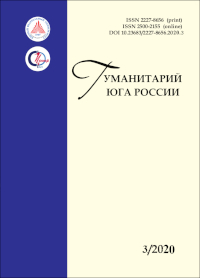К вопросу о значимости духовного производства в развитии современного гуманитарного знания
Научная статья
Аннотация
Литература
Гегель Г. Соч. : в 14 т. М.; Л., 1934. Т. 7. 384 с.
Гобозов И.А. Социальная философия : учебник для вузов. М. : Академический проект, 2007.
Горохов В.Г. Как возможны наука и научное образование в эпоху «академического» капитализма? // Вопросы философии. 2010. № 10. С. 3–13.
Кант И. Соч. : в 6 т. М., 1963–1966. Т. 3.
Киященко Н.И. Культура гражданского общества // Вопросы философии. 2010. № 10. С. 62–66.
Конт О. Курс позитивной философии. // Антология мировой философии : в 4 т. 1971. Т. 3. 760 с.
Крапивенский С.Э. Социальная философия. Волгоград, 1996. 256 с.
Лешкевич Т.Г. Философия науки : учеб. пособие. М. : ИНФРА-М, 2008. 260 с.
Липчанская И.В. Генезис научной элиты (социально-философский анализ). Germany: LAP LAMBERT Academic Publishing GmbH & Co, Germany, 2011. 156 с.
Луков В.А. Миссия интеллигенции в современном российском обществе // Знание. Понимание. Умение. Режим доступа: http://www.zpu-journal.ru/e-zpu/.
Маркс К., Энгельс Ф. Соч. 2-е изд. М. : Наука, 1980. Т. 3. 565 с.
Микешина Л.А. Трансцедентальные измерения гуманитарного знания // Вопросы философии. 2006. № 1. С. 49–66.
Петров М.К. Самосознание и научное творчество. Ростов н/Д. : Мысль, 1992. 346 с.
Полани М. Личностное знание. М. : Прогресс, 1985. 345 с.
Степин В.С. Становление научной теории. Минск : Наука, 1976.
Холтон Дж. Что такое антинаука // Вопросы философии. 1992. № 2. С. 121–128.
Фихте И.Г. Общие принципы наукоучения // Антология мировой философии : в 4 т. 1971. Т. 3. 760 с.
Hübner K. Über verschiedene Zeitbegriffe in Alltag, Physik und Mythos // F.M. Korff (Hrsg.). Redliches Denken. Festschrift für G.-G. Grau, Stuttgart, 1982.
Поступила: 30.04.2020
Опубликована: 18.07.2020






